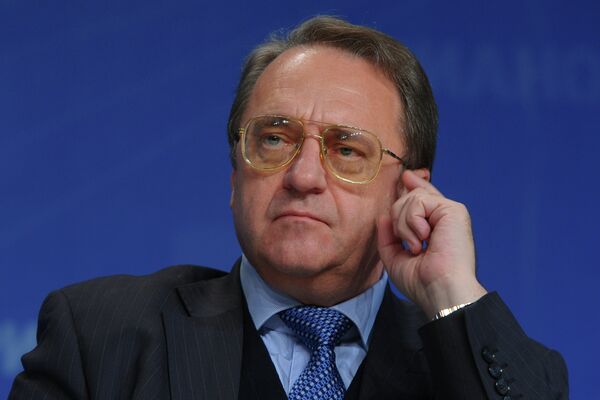MOSCOW, July 7 (RIA Novosti) – Moscow has reiterated its proposal to engage Turkey, Iran, Saudi Arabia and other states in the Syrian reconciliation effort, Russian Deputy Foreign Minister Mikhail Bogdanov said in an interview with RIA Novosti Monday.
Bogdanov said “an idea to create a parallel track” to the Geneva talks has been voiced in order to boost the negotiations between the Syrian government and opposition groups.
“It is an auxiliary course [of negotiations], not an alternative [to the Geneva reconciliation process]. In the past, we discussed engaging countries that might have a positive influence on Syrians: [take] Russia and the United States, as the co-initiators of the Geneva-2 talks, add Saudi Arabia, Iran, Turkey, Egypt, maybe Qatar, and bring in the United Nations. We still suggest discussing this idea,” the Russian diplomat said.
Bogdanov said Russia is ready to discuss other similar proposals.
The full potential of Geneva -2 international peace talks on the future of Syria has not yet been achieved, according to the Russian diplomat.
“Two rounds [of the talks] in fact lasted for only three weeks, it’s a very short time, especially since there was another problem – the [Syrian] opposition delegation was not representative enough,” Bogdanov added.
Syrian society is experiencing a crisis of trust, so it needs more time needed for reconciliation, the diplomat said, noting that it took Lebanon eleven months to form a coalition government.
“Here is another example. US Secretary of State John Kerry was playing a mediating role between the Palestinians and Israelis for nine months and it was not enough [for reconciliation], but everyone realized that the task was not easy and required time, persistence, perseverance and political wisdom,” Bogdanov added.
Russia is waiting for the United Nations to make a decision on a successor for the position of UN and Arab League Special Envoy to Syria, the diplomat said, noting that it is also important to define a mandate for the possible successor to Lakhdar Brahimi.
“Brahimi played a mediating role between the Syrians, with the intent of establishing the negotiation process, to promote it and eventually come to an amicable solution and guarantee its implementation. Back then we had an understanding of how [Brahimi] worked, and how and on what we had to help him. Now the question is not only who to appoint, but what goal the new person will have,” Bogdanov underlined.
UN and Arab League Special Envoy to Syria Lakhdar Brahimi resigned in May. Brahimi presided over two rounds of peace talks between the government of President Bashar Assad and the Syrian opposition in Geneva this January and February, but yielded no major results.
An armed conflict broke out in Syria in March 2011 and has since claimed more than 130,000 lives, according to UN estimates. Government troops are fighting various armed groups, including foreign mercenaries.
Moscow has repeatedly condemned the rise of terrorism in Syria and has urged the international community to take steps toward a peaceful settlement of the conflict.


